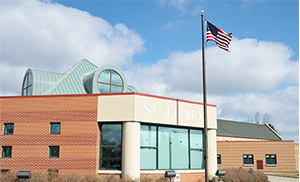 It can if you’re Chris Saglimbene. At 25 years old, he’s a 20-year “veteran” of Mortal Kombat, remembering his days at Sports World in Paramus, N.J. “My father would get behind me and stand me up so I could use the arcade machine. So I got an early start in gaming.”
It can if you’re Chris Saglimbene. At 25 years old, he’s a 20-year “veteran” of Mortal Kombat, remembering his days at Sports World in Paramus, N.J. “My father would get behind me and stand me up so I could use the arcade machine. So I got an early start in gaming.”
Saglimbene, an adult patient at Matheny, says that exposure helped improve his hand and eye coordination, and he continued to be a video game aficionado throughout his childhood and adolescence. So, when Mortal Kombat 9, the latest version of the game debuted, he decided to create and choreograph a dance inspired by the game.
“I thought it would just be a fun project,” Saglimbene says, “but as more and more of the dance got done, I began to feel it had the potential to make a big splash. As far as I know, I’m the only choreographer who’s done a dance based on a video game.”
Saglimbene worked through Matheny’s Arts Access Program, which enables people with disabilities to create fine art, assisted by professional artist-facilitators. He used specific movements from the game and asked the dancers to emulate them. “Our dancers are not exactly trained in stage combat, but they do it really well,” he says. “When there was something they didn’t get, I took them into the studio and showed them a YouTube video. They soaked things up pretty much like a sponge.”
The two dancers, both Arts Access staff members, are Corey Bliss and Elizabeth Zelesny. Bliss graduated from the Ailey/Fordham BFA program in 2007 and trained at the New Jersey Dance Theatre Ensemble. She is also on the faculty at the Yvette Studio in Cranford. Zelesny has a BA in dance and journalism from Rider University and has studied at the American Ballet Theatre, Joffrey Ballet School and Princeton Ballet School, among others.
Saglimbene’s dance, called “Reptile Theme,” will be performed at Full Circle 2011: Dimensions, the annual celebration of the Arts Access Program, to be held Saturday, November 5, from 3-6 p.m. at the Robert Schonhorn Arts Center on the Matheny campus.
After Full Circle, Saglimbene plans to make a video of the dance and send it to the creators of the game. “And then,” he adds, “who knows? I hope people walk away from and this say, ‘Wow!’ I want that ‘wow’ factor.”
Admission to Full Circle is $25. To register, log onto www.matheny.org and click on Full Circle 2011 under What’s New or call (908) 234-0011, ext. 260.
Above, Chris is pictured with Corey Bliss, left, and Elizabeth Zelesny in costume.
 Kaila was born with spina bifida and a condition called cri du chat syndrome, a rare genetic disorder causing intellectual disability and delayed development. When she was 14 years old, her parents, Tad and Kim, decided Kaila had outgrown her special services classroom in her public middle school.
Kaila was born with spina bifida and a condition called cri du chat syndrome, a rare genetic disorder causing intellectual disability and delayed development. When she was 14 years old, her parents, Tad and Kim, decided Kaila had outgrown her special services classroom in her public middle school.

















